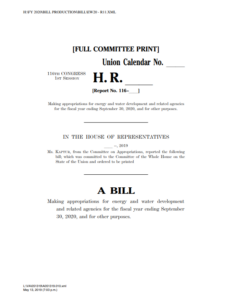The US House Appropriations Committee released the draft fiscal year 2020 Energy and Water Development, and Related Agencies funding bill. The legislation funds the US Army Corps of Engineers, Department of the Interior programs, the Department of Energy, and other related agencies.
Overall, the legislation contains $46.4 billion in funding to spur energy innovation that will increase economic prosperity while working to mitigate and adapt to climate change, improve the nation’s water infrastructure, and enhance national security. This represents an increase of $1.8 billion, or 4%, above the fiscal year 2019 enacted level. The bill includes $23.3 billion for non-defense activities, an increase of $1.1 billion above the fiscal year 2019 enacted level, and $23.1 billion for defense spending, an increase of $673 million above the fiscal year 2019 enacted level.
House Appropriations Subcommittee on Energy and Water Development, and Related Agencies Chairwoman Marcy Kaptur, stated:
Funding innovative programs at the Department of Energy and the jobs that comes from them, shoring up our energy and water infrastructure to bolster trade, and promoting a comprehensive approach to the challenges of one of our most precious resources, fresh water, have been among my highest priorities as Chairwoman
[smlsubform prepend=”GET THE SAFETY4SEA IN YOUR INBOX!” showname=false emailtxt=”” emailholder=”Enter your email address” showsubmit=true submittxt=”Submit” jsthanks=false thankyou=”Thank you for subscribing to our mailing list”]
The bill makes critical investments to mitigate climate change and improve US’s water infrastructure. It also ensures a credible nuclear deterrent and increases funding for nuclear nonproliferation programs.
Moreover, the bill rejects the President’s drastic, short-sighted cuts across the Department of Energy, Army Corps of Engineers, and the Bureau of Reclamation. These investments aim to keep the US at the forefront of global energy innovation, enable American companies to ship goods efficiently, and provide water and electricity to tens of millions of Americans.
For her side, House Appropriations Committee Chairwoman Nita Lowey, believes that:
Recent natural disasters have made undeniably clear the need to invest in robust water infrastructure that is more resilient to future storms. Just as important is investing in clean energy technologies that are environmentally sound and economically advantageous
She added that this bill meets these priorities, while it also makes smart investments in US’s national security by maintaining a credible nuclear deterrent and addressing threats of proliferation.
In addition, the bill provides $2.65 billion, an increase of $273 million more than the fiscal year 2019 level and $2.3 billion above the request. This funding provides for clean, affordable, and secure energy and ensures American leadership in the transition to a global clean energy economy.
What is more, it provides $150 million, an increase of $30 million above the fiscal year 2019 level. This funding provides for efforts to secure the nation’s energy infrastructure against all dangers, reduce the risks of and impacts from cybersecurity events, and help with restoration activities.
Finally, it provides $7.175 billion, equal to the fiscal year 2019 level and an increase of $706 million above the President’s budget request. This funding is used for nuclear waste cleanup at 16 sites across the country.
You may see the bill in the PDF below


































































